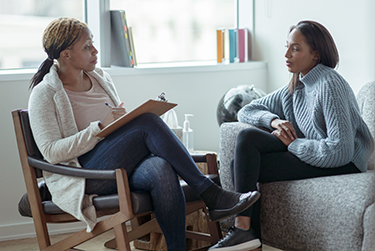Health professionals who have researched the mental health effects of the COVID-19 pandemic said they found disparities among vulnerable populations, such as communities of color, low-income individuals and people with preexisting mental health conditions, during the APHA 2022 Tuesday session “COVID-19 and Mental Health in Vulnerable Populations.”
Gilbert Nick, with the Graduate Center of the City University of New York and the Nathan S. Kline Institute for Psychiatric Research, and his team studied psychosocial determinants of health. While the general population struggled with the way the pandemic disrupted daily life and isolated individuals, Nick said people already feeling the effects of social determinants of health, such as systemic racism and poverty, felt the impacts of the pandemic more. 
“There’s a link between getting COVID-19 and being poor,” Nick said. “For families with low income, COVID intensified financial hardship and created barriers to seeking help. Lower-income individuals were also more likely to be hospitalized for COVID-19 or need intubation.”
Nick said his research found that people with preexisting behavioral or mood disorders experienced more psychiatric distress than others, particularly when combined with social determinants of health. When broken down into racial or ethnic groups, Hispanic populations had higher levels of psychiatric distress than Black or white populations, he said.
Sydney Johnson, with the University of Minnesota School of Public Health, studied the role that trauma and post-traumatic stress disorder play in reactions to the pandemic. She said people who have experienced traumatic events, and specifically people who have PTSD, have a heightened vulnerability and typically had more extreme reactions to the pandemic.
Johnson said she and her research team discovered that study participants who had PTSD experienced feelings of fear and uncertainty surrounding the COVID-19 pandemic, while participants without PTSD were most concerned about restrictions on everyday activities and social events. The research team also found that study participants who had PTSD saw people who were not taking the pandemic as seriously as “irresponsible” and experienced heightened anger and frustration.
“People with PTSD are more likely to see stressors as real threats, and that may magnify the pandemic for them. We can use these findings and others to adapt to any future disasters,” she said.
Matthew Tumpney, an epidemiologist with the Massachusetts Department of Public Health, studied the impact of the COVID-19 pandemic on the mental health of LGBTQ individuals using results from the Massachusetts COVID-19 Community Impact Survey.
Tumpney found that LGBTQ individuals who were surveyed were up to three times more likely to report persistently poor mental health during the pandemic than cisgender or heterosexual survey respondents. He said more than half of nonbinary and transgender individuals reported having delays in routine mental health care due to canceled appointments, not wanting to go to the doctor in-person out of fear of getting sick, not having a private space for telehealth appointments or not having reliable transportation.
Overall, LGBTQ survey respondents are more negatively affected by social determinants of health when compared to the baseline group, Tumpney said.
Victoria Ngo, associate professor at the City University of New York Graduate School of Public Health and Health Policy, and her research team wanted to focus on the effects of the COVID-19 pandemic on mental health locally, so they studied its impact on residents of the New York City’s Harlem neighborhood.
The researchers identified that living in low-income housing; a history of alcohol abuse; experiencing food insecurity, employment insecurity or housing insecurity; experiencing interpersonal violence; and having a negative perception about the police were all factors that increased mental health risks. Ngo said pandemic response interventions need to address mental health as it relates to social risks, especially for people in low-income housing.
“We need to have a much more comprehensive approach to pandemic response that’s not just about COVID-19 and keeping folks safe physically, but also emotionally,” Ngo said.
By FatCamera, iStockphoto.